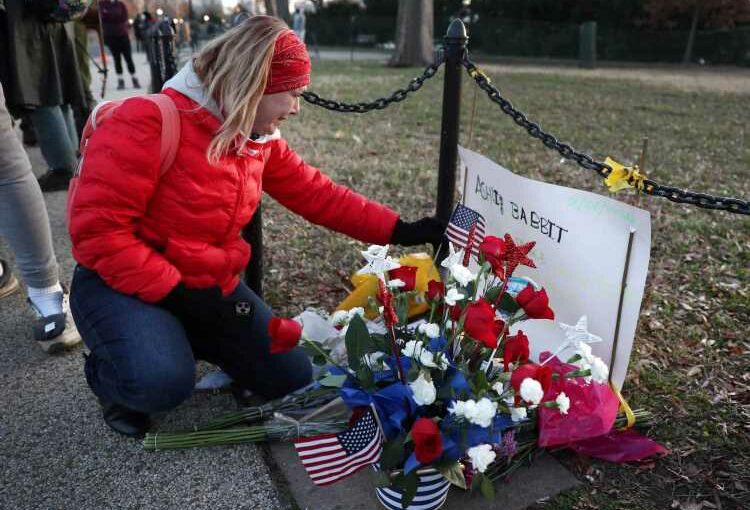- Lt. Michael Byrd, the officer who fatally shot Ashli Babbitt during the Jan. 6 Capitol invasion, said in his first comments after publicly revealing his identity that the unarmed rioter was "posing a threat" to Congress.
- "I had been yelling and screaming as loud as I was, 'Please stop, get back, get back,'" Byrd told NBC Nightly News' Lester Holt in an interview that aired Thursday evening.
- The officer's remarks came three days after the U.S. Capitol Police Department said that it would not discipline him following an internal investigation of the shooting.
Lt. Michael Byrd, the officer who fatally shot Ashli Babbitt during the Jan. 6 invasion of the U.S. Capitol, said in his first comments after publicly revealing his identity that the unarmed rioter was "posing a threat" to Congress.
"I had been yelling and screaming as loud as I was, 'Please stop, get back, get back,'" Byrd told NBC Nightly News' Lester Holt in an interview that aired Thursday evening.
"You're ultimately hoping your commands will be complied with, and unfortunately they were not," he said.
The officer's remarks came three days after the U.S. Capitol Police Department said that it would not discipline him following an internal investigation of the Jan. 6 shooting. The Department of Justice in April said it would not pursue criminal charges against the officer.
Neither of those agencies identified the officer as they shared their findings. The USCP in a press release Monday noted, "This officer and the officer's family have been the subject of numerous credible and specific threats."
Byrd shot Babbitt, a 35-year-old Air Force veteran, in the Capitol on Jan. 6 as she attempted to climb through an opening in a barricaded door where a glass panel had broken out, the Justice Department's investigation found.
Babbitt was part of a group of pro-Trump rioters who had gathered in a hallway outside the Speaker's lobby, which leads to the House chamber. A joint session of Congress was forced to evacuate the House and Senate chambers as a mob of hundreds of people invaded the building, temporarily derailing efforts to confirm President Joe Biden's Electoral College victory.
Byrd, who was inside the lobby as Babbitt tried to crawl through the door, drew his service pistol and shot her once in the left shoulder, causing her to fall backward onto the floor, the DOJ found. She was transported to Washington Hospital Center, where she died, according to the agency.
"She was posing a threat to the United States House of Representatives," Byrd told NBC.
Asked what he could see when he fired his weapon, Byrd said, "You're taught to aim for center mass. The subject [Babbitt] was sideways, and I could not see her full motion of her hands or anything."
"Her movement caused the discharge to fall where it did," he said.
A lawyer for Babbitt's family, Terrell Roberts, has maintained that Byrd "ambushed" Babbitt and shot her with "no warning." Roberts did not immediately respond to CNBC's request for comment on Byrd's interview.
Babbitt has become a martyr on the far right, with many demanding that the name of the officer who shot her be disclosed. Babbitt's family, which has vowed to file a multimillion-dollar lawsuit against the police department and Byrd, has raised thousands from online donations.
Former President Donald Trump claimed Babbitt was "murdered at the hands of someone who should never have pulled the trigger of his gun."
Byrd, who is Black, said he has lived in hiding for months since Jan. 6, but has nevertheless been the target of threats from those who speculated that he was Babbitt's shooter.
"They talked about killing me, cutting off my head," Byrd said. "There were some racist attacks, as well."
"It's all disheartening, because I know I was doing my job," he said.
Byrd said he "of course" has concerns about coming forward, calling the move "frightening." But "I believe I showed the utmost courage on January 6 and it's time for me to do that now," he said.
Byrd in the interview also addressed a prior incident that put his name in headlines, when in 2019 he left his Glock 22 in a bathroom in the Capitol.
That was "a terrible mistake," he told NBC's Holt. "I owned up to it … I was penalized for it and I moved on."
Source: Read Full Article
